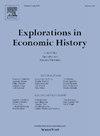从身份到合同?近代早期英国判例法和印刷文化的宏观历史
IF 1.7
1区 历史学
Q1 ECONOMICS
引用次数: 0
摘要
大多数包含法律的现代化或发展理论都强调,随着法律变得公正,与所有人相关,个人选择的范围也会扩大。这种概念的早期表达是亨利·缅因(1822-1888)著名的格言,即进步社会从地位走向契约。我们将机器学习应用于两个早期现代英语语料库,分别是判例法和印刷文化,对缅因的猜想进行了调查。我们在每个语料库上训练词嵌入,并生成强调契约、状态和契约与状态的时间序列。只有判例法表现出对契约与地位的日益强调,即使是这种趋势也只是在南北战争之前才可以看出。因此,我们的研究结果表明,强调个人选择扩大的发展理论并不是工业革命前一个世纪英国的特征。1660年以后,判例法的发展趋势反映出衡平法相对普通法的重要性日益增加,衡平法越来越强调地位。这种影响在家庭和继承法中尤为明显。在印刷文化中,宗教一贯强调契约而不是地位,而政治则呈现出强调契约而不是地位的下降趋势。VAR估计表明,判例法和印刷文化中的思想是共同进化的。本文章由计算机程序翻译,如有差异,请以英文原文为准。
From status to contract? A macrohistory from early-modern English caselaw and print culture
Most modernization or development theories that incorporate law emphasize a growth in the scope of individual choice as law becomes impartial, relevant to all. An early expression of this conceptualization was Henry Maine's (1822–1888) celebrated dictum that progressive societies move from status to contract. We conduct an inquiry into Maine's conjecture using machine-learning applied to two early-modern English corpora, on caselaw and print culture. We train word embeddings on each corpus and produce time series of emphases on contract, status, and contract versus status. Only caselaw exhibits an increasing emphasis on contract versus status, and even that trend is discernible only before the Civil War. Thus, our findings indicate that development theories emphasizing the widening of individual choice do not characterize England in the century prior to the Industrial Revolution. After 1660, caselaw trends reflect the increasing importance of equity compared to common-law, with equity increasingly emphasizing status. This effect is particularly evident in family and inheritance law. In print culture, religion consistently emphasizes contract over status while politics exhibits a downward-trending emphasis on contract versus status. VAR estimates reveal that ideas in caselaw and print culture coevolved.
求助全文
通过发布文献求助,成功后即可免费获取论文全文。
去求助
来源期刊

Explorations in Economic History
Multiple-
CiteScore
2.50
自引率
8.70%
发文量
27
期刊介绍:
Explorations in Economic History provides broad coverage of the application of economic analysis to historical episodes. The journal has a tradition of innovative applications of theory and quantitative techniques, and it explores all aspects of economic change, all historical periods, all geographical locations, and all political and social systems. The journal includes papers by economists, economic historians, demographers, geographers, and sociologists. Explorations in Economic History is the only journal where you will find "Essays in Exploration." This unique department alerts economic historians to the potential in a new area of research, surveying the recent literature and then identifying the most promising issues to pursue.
 求助内容:
求助内容: 应助结果提醒方式:
应助结果提醒方式:


